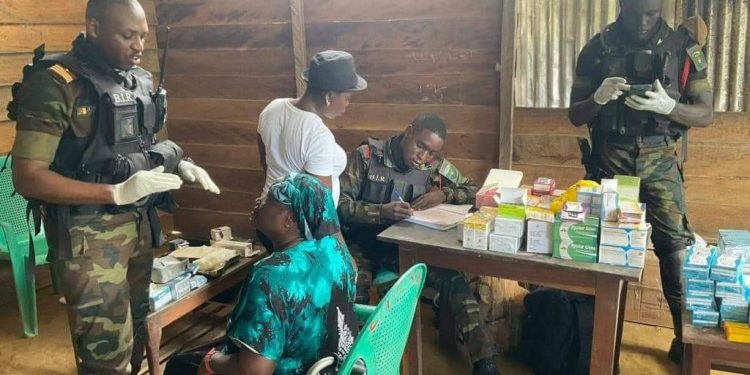The relationship between the Cameroonian military and the population in the crisis-hit Anglophone regions has been a complex and evolving issue.
This year’s National Day theme, which highlights the crucial role of the armed forces in preserving Cameroon’s territorial integrity, underscores the delicate balance the army must maintain in regions plagued by separatist violence since 2017.
The North West and South West regions have been particularly troubled, with the military ramping up several human rights abuses that have strained its relations with the population.
They have been involved in incidents of arson, arbitrary arrest, torture and detention, summary executions, and other abuses.
Historically, the defense and security forces enjoyed a cordial relationship with the local population.
However, since 2017, the emergence of armed separatist groups targeting soldiers has drastically altered this dynamic.
Civilians, caught in the crossfire, have faced severe repercussions, including the loss of homes, livelihoods, and lives due to both military and separatist actions.
The government’s call for the population to report violent incidents has placed civilians in a precarious position, making them direct targets for separatists.
MMI has reported several incidents where separatist fighters killed civilians accused of collaborating with the army. Notable among them is the public execution of two men in Guzang, North West, who were accused of links with the Cameroon military.
Despite their efforts to aid in restoring peace, those who reported incidents often faced brutal reprisals from separatist groups.
This perilous situation has further strained the relationship between the population and the military, leading to widespread mistrust and fear.
Despite these challenges, recent efforts by the security forces indicate a shift towards rebuilding trust and fostering cooperation with the local communities.
Both military and civil authorities say the army is rebuilding positive relations with the population, who are being obliged to report and denounce separatists.
The Rapid Intervention Battalion’s inauguration of proximity units in Wum, Kumbo, and Mbengwi, with plans for similar units in Batibo and Bali, marks a significant step in this direction.
These units aim to enhance security and provide a sense of safety for residents.
Additionally, the military has engaged in various community support initiatives.
During the COVID-19 pandemic, they conducted health campaigns in Bangolan, provided medical assistance in Ntumbaw following the tragic Ngarbuh Massacre, and donated health equipment while offering free consultations and treatments in Nkambe.
Efforts to renovate classrooms in Nwa, Bui, Donga Mantung, and Menchum Divisions further demonstrate the military’s commitment to supporting local communities and improving living conditions and education.
In the South West Region, the military, organised a health campaign in Buea, one of the key towns in the Anglophone regions offering free consultation services to the population for various illnesses.
Members of the Rapid Intervention Battalion (BIR) have also attempted to rebuild friendship with people in localities like Muea, in Buea, by assuring the population of their safety and offering them their emergency contacts.
While attacks on civilians by security forces have decreased, according to a recent report by human rights organization, CHRDA, incidents still occur.
In an interview granted to the state radio, CRTV Buea, the Governor of the South West, Bernard Okalia Bilai, said the population has been adhering to his call for collaboration with the army.
“I can say, with all respect, that the collaboration has been wonderful,” said Governor Okalia Bilai.
“When we launched the initiative of terrorising the terrorists, the population of the South West Region welcomed that initiative and they responded… So the population has well responded. They welcomed that slogan and today many actions have been taken successfully by the forces of law and order and we have significantly reduced the attacks, the destruction…”
These initiatives by the military, though impactful, are just the beginning of a long journey toward reconciliation and stability in the Anglophone Regions.
As Cameroon commemorates its National Day, the theme of celebrating the army’s role in national unity is particularly important.
The efforts to restore and strengthen the relationship between the army and the population in these troubled regions are crucial.
Although much work remains to be done, these initiatives offer a glimmer of hope for a future where peace and cooperation prevail.
©Mimi Mefo Info – Military and Anglophone population



